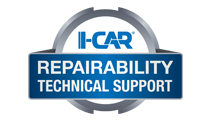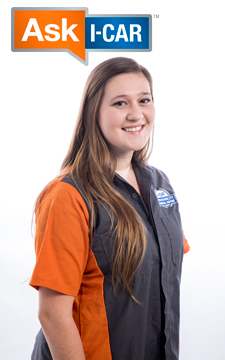OEM Restraints System Part Replacement Search
2019 Audi A3/S3/RS 3 Sedan
Share:
|
DISABLE PROCEDURE AND TIME (Always Check Service Manual)
The pyrotechnic components may be checked only whenthey are installed and with a vehicle diagnostic tester ad-
proved by the manufacturer.
When working on the Airbag System (pyrotechnic components, Airbag Control Module • J234• , wiring):
1) The battery ground cable must be disconnected with the ignition SWITCHED ON. Then cover the negative terminal.
2) Wait for 10 seconds after disconnecting the battery
REV: 04/2020
PARTS THAT MUST BE REPLACED FOLLOWING A DEPLOYMENT
Airbag Control Module must be Replaced [MODULE,AIRBAG CONTROL]:• With driver and passenger airbag deployment “but not with airbag generation 9.•, 10.• and 8.R
• After three side, driver, and passenger airbag or belt tensioner deployments
Always Replace the Following:
• All triggered airbag units [AIRBAG,STEERING WHEEL; AIRBAG,INSTRUMENT PNL; AIRBAG,KNEE BOLSTER; AIRBAG,FRONT SEAT; AIRBAG,REAR SEAT; AIRBAG,ROOF]
Also with Passenger Airbag Deployment:
• Instrument Panel
• Deformed passenger module supports (cannot be reformed)
• All sensors for front airbag on front end [AIRBAG SENSOR,FRONT]
• Remaining cross acceleration sensors if anchorage point is deformed in sensor region [AIRBAG SENSOR,FRT DOOR; AIRBAG SENSOR,QTR PANEL]
Also with Driver Airbag Deployment:
• Coil connector with slip ring [CLOCK SPRING]
• All sensors for front airbag on front end [AIRBAG SENSOR,FRONT]
• Remaining cross acceleration sensors if anchorage point is deformed in sensor region [AIRBAG SENSOR,FRT DOOR; AIRBAG SENSOR,QTR PANEL]
Also with Side Airbag Deployment:
• Pressure sensors on deployed side
• Cross acceleration sensors on deployed side [AIRBAG SENSOR,FRT DOOR; AIRBAG SENSOR,QTR PANEL]
• Cover
• Cushion
• with a folding rear seat backrest: side cushion (if equipped)
• Remaining cross acceleration sensors if anchorage point is deformed in sensor region [AIRBAG SENSOR,FRT DOOR; AIRBAG SENSOR,QTR PANEL]
In Addition:
• All automatic belt retractors with deployed belt tensioners.
• All belt retractors with deployed belt force limiters (depending on equipment)
• Seat belt latches for all automatic belt retractors with deployed seat belt tensioners with the belt on
• Seat belt height adjuster (manual and power) for all automatic belt retractors with deployed seat belt tensioners with the belt on
PARTS THAT MUST BE INSPECTED AND REPLACED IF DAMAGED
After an accident, all damaged parts must be replaced. If no airbag unit damage is detected, the unit can still be used.Airbag Control Module:
• The airbag control module can be used for up to two deployments of the side, driver and passenger airbag and/or belt tensioner with airbag generation 8.• not 8.R.
• The airbag control module can be used for up to two side, driver and passenger airbag and/or belt tensioner deployments with airbag generation 9.•, 10.• and 8.R.
• After the third deployment, the malfunction display “Control module defect” appears.
Airbag Control Module must be Replaced:
• if housing is damaged
• if there is deformation on tunnel in 200 mm circumference around control module
If thorax airbag units are replaced, the new thorax airbag number sticker should be removed and placed over the old sticker on the seat pan.
Each time an airbag or passenger belt tensioner deploys, a basic setting must be performed on the seat occupied recognition control module, refer to Vehicle Diagnostic Tester.
If the seat rails and/or seat pan is replaced after an accident due to deformations resulting from a crash, the passive occupant detection system must be replaced using the “passive occupant detection system service kit”. Perform a “basic setting” on the passenger occupant detection system control module, refer to Vehicle Diagnostic Tester.
Before replacing the airbag control module:
– Connect the Vehicle Diagnostic Tester if there is a chance the belt tensioner and/or seat belt force limiter deployed.
– In guided fault finding under “15 • Airbag”, check whether there is a crash entry in the airbag control module.
– Also check if the “Resistance too large” error is stored for the belt tensioner and/or belt force limiter. Deployed belt tensioners and/or belt force limiters must fulfill both conditions. “Prerequisite: the airbag control module was not replaced yet”.
– If parts of the seat belt system are removed due to an accident, replace the belt system bolts.
– If needed (visual inspection), the following must also be replaced: all faulty components.
After replacing the airbag units or the control module, affix stickers (only tear-off strips) to the registration card and return the registration card to the relevant Sales Center or to the Importer for registration
All damaged securing pieces must be replaced, you cannot reshape components or make them fit.
The following components must be checked after every airbag deployment.
With a Passenger Airbag Deployment:
• Instrument panel central tube, passenger airbag supports and passenger airbag must be installed free of tension. Replace central tube.
• Check the glove compartment for damage. Replace the glove compartment if damaged.
With a Driver Airbag Deployment:
• Steering wheel: Remove the steering wheel and place it with the rim on a flat surface. The entire steering wheel rim must rest on the surface. Otherwise, steering wheel should be replaced.
• Check steering wheel for smoke residue. If smoke residue is present, replace steering wheel.
Collision without Airbag Deployment
• If the Airbag Indicator Lamp -K75• does not indicate a malfunction, then it is not necessary to replace the pyrotechnic components. Seat belts must be inspected separately.
After every accident the seat belt system must be inspected systematically
| Additional Information |
*This matrix does not currently contain all production vehicles sold in the United States. Please refer back to this page frequently to ensure the most up-to-date information. The following charts were developed in cooperation with AudaExplore, a Solera company. The contents are based on the information available at the time of publication. To ensure that the most recent information is used, always refer to the vehicle maker's technical information before working with airbags and other passive restraint systems.









